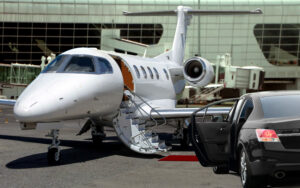When most people think about private aviation, they concentrate on the plane, high net worth individuals and the flights themselves. Yet private aviation clients need more than just an aircraft to get them from A to B, this is where ground transportation plays a huge role.
Leigh Westwood, director of operations, Luxaviation UK says, “Dynamic approaches to trip support are critical in the private aviation sector, especially when catering to high-profile clients who have tight schedules and unpredictable needs.”
He adds that the UK and Europe have seen a noticeable shift in ground transport demands from private aviation clients in recent years. One focus, he says, is on sustainability. Clients are increasingly requesting eco-friendly ground transportation options, such as hybrid or electric vehicles. This is driven by their growing focus on reducing their carbon footprints, and their wish to promote the wider efforts to support sustainability and green initiatives in business travel.
Luxury and personalization
Other trends include an emphasis on luxury and personalization, a need for enhanced security measures in ground transportation, particularly for high-profile VIP clients, and for connectivity between flight and ground transport. Westwood says connectivity has become more crucial than ever because clients expect to receive a seamless experience, with real-time updates on flight status and ground transport schedules. He claims that this means that ground transportation providers need sophisticated systems in place that synchronize directly with flight operators and fixed-based operators (FBOs) to ensure that the vehicles are ready and waiting upon landing.
Martin Jackson, proprietor of Advectus Executive Chauffeur, says 85% of his clients come from US companies. They include leaders of industry and celebrities. “Out of the top 20 US conglomerates, we chauffeur at least 9 of them, which we’re very pleased about,” he says. Business is gained largely by word of mouth, so the delivery of a flexible, high quality and personalised service is crucial – without which they would not be recognised and recommended.
Advectus is based close to Luton Airport, and this helps to stimulate last minute calls for ground transportation because some FBOs don’t have chauffeur services organized.
Jackson says, “The majority of my American business comes from FlightPro International, and they have a big presence here in London. We do all their ground transport for them in London. I also get business direct from the client or PIC (pilot in charge), thanks to previous bookings and past reputation. There is repeat business and word of mouth. It’s nice to get it that way.”
Safe, efficient and quick travel

Alan Owen, UK SR manager and director of FlightPro International explains that it’s his company’s job to look after the entire operation of the aircraft. While the pilots fly the planes, his team looks after everything else – including ground transportation. “Executives who travel aboard private aircraft connect to ground transportation after landing and we need to ensure they travel safely, efficiently, and as quickly as possible,” Owen says.
He adds that quality and security are imperative. To that end background checks are conducted on the executive ground transportation companies FlightPro International works.
He also stresses that time and privacy are also important factors in the delivery of a high-quality service.
“It is often a matter of getting passengers quickly to their business meetings straight after landing and back to their aircraft for departure. Passenger plans can change quickly and you need experience to make the right decisions to meet their demands. Passengers who fly on private aircraft find ground transportation very important as it is an extension of their travel.”
No apps
Jackson describes his company as being part of a niche market that hasn’t seen any drastic changes. While a lot of chauffeurs are going app-based, using smart devices, web and mobile applications to allow clients to book a vehicle and a driver, he prefers to offer a personal touch. This means that clients see the same drivers over and over again. He subsequently claims this is why he sees the same clients coming back, partly because they
like continuity.
Most of his clients travel around the London area. So to ensure a fast and stress-free onward journey from their meetings to the plane, or from the plane to their meetings, it’s vital to ensure that onward travel is considered within the flight planning. There can’t be any wing and a prayer activity.
Even before a client gets into a vehicle, it’s important to look at all the routes to make sure that they don’t get stuck, wherever possible, in traffic jams. To prevent such a scenario, Advectus constantly monitors the dynamics of traffic flow in London.
Professionalism and prestige
Kevin Singh, founder and CEO of Icarus Jet says, “Ground transportation reflects the professionalism and prestige of an organization and contributes to the overall satisfaction of executive clients. Whether it’s a chauffeured limousine for a high-level meeting or a secure convoy for a VIP delegation, ground transportation services are tailored to meet the specific needs and preferences of each client.”
Petra Dlabolova, Euro Jet’s operations command center manager, adds that if passengers or flight crew require ground transportation, she strives to provide a VIP service with a car – and in certain regions – an English-speaking driver. She believes that the careful preselection of a reliable provider is key.
She says, “We aim to provide the customer with the driver’s details in advance whenever possible. This is one of the most important requirements from our clients. They feel comfortable when they can have direct contact with the driver in case of any last-minute delays or issues.” At some airports, this may include direct car ramp access upon the client’s request.
Vehicle types and security

Igor Martet, CEO of Drivania, says executive ground transport services generally involve vehicles such as luxury sedans for up to three passengers, or SUVs, executive vans, and mini-vans for up to six or seven passengers. He explains, “While the choice of vehicle is important, the key factor is the driver’s professionalism, which includes driving expertise, language skills, proper attire, problem-solving abilities, and local knowledge to assist passengers beyond just driving.”
In some cases, says Singh, armored vehicles are required by clients that have heightened security concerns. Ground transportations services may also necessitate not just professional chauffeurs, Wi-fi connectivity, refreshments, meet-and-greet services, but also security escorts. The latter is usually available upon the request of a client. “Executive ground transportation providers understand that each client has unique needs and preferences,” Singh says.
“Security concerns significantly impact trip support, particularly when flying to regions where the threat level may be elevated. In these cases, trip support teams must assess the situation carefully, possibly recommending enhanced security measures both in the air and on the ground.
“For destinations with higher security risks, the use of armored vehicles and security-trained drivers for ground transportation becomes crucial, alongside close coordination with local security forces or agencies,” Westwood adds.
Tailoring services
The tailoring of services requires FBOs and ground transportation services to work closely with their clients and to develop long-lasting relationships to get to know their needs and requirements better. This will include understanding whether the ground transportation is for an individual or for a group of people – to allow the right vehicle to be selected. There is also a need to consider luggage requirements, and upon the request of a client to collect luggage from an airport to dispatch it to their hotel or another location. Tailoring includes choosing the most efficient route to a destination, as well as the coordination of the pick-up and drop-off times with the flight schedules and appointments.
Then there are special requests. These include the need to accommodate preferences for specific vehicles, amenities, or services. “By taking a personalized approach, ground transportation providers can exceed client expectations and create a truly memorable travel experience,” says Singh.
Rising fuel prices and insurance

According to Owen, there is much competition between chauffeur companies. However, they all face challenges such as the price of fuel and insurance, which have gone in his words, “through the roof.” Despite this, they have to keep the prices as fair as possible as well. With an increasing focus on sustainability and reducing carbon emissions, clients are increasingly demanding electric vehicles as their main preference – making it a priority for ground transportation service providers.
Nevertheless, their existing cars are unlikely to be replaced anytime soon. Meanwhile, he says SatNav, tracking devices, mobile phones and communications with agents and dispatch have all improved the comport of our traveling passengers significantly, and the provision of in-vehicle Wi-fi has turned vehicles into mobile officers, allowing executives to business and work while on the go. He expects internet and phone coverage to continue to improve with increased download speeds inside moving vehicles. However, technology won’t replace the personal touch.
The key to success is the integration between flight planning and trip support – including within that framework, ground transportation. This means that ground transportation services need to develop long-standing relationships with their constituent FBOs and trip support companies by sharing live updates on jobs to ensure seamless transfers. However, clients can often also book directly with a ground transportation service provider, perhaps as a result of having developed a close relationship with them over many years.





